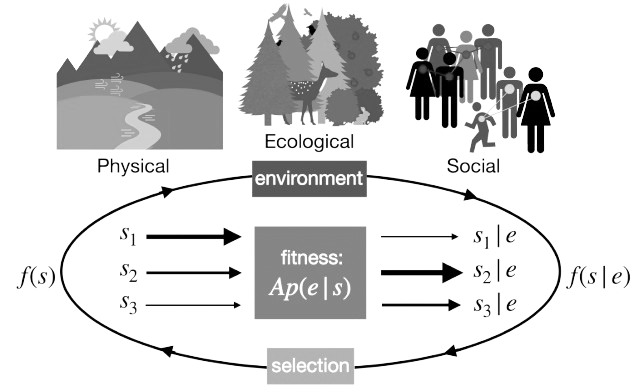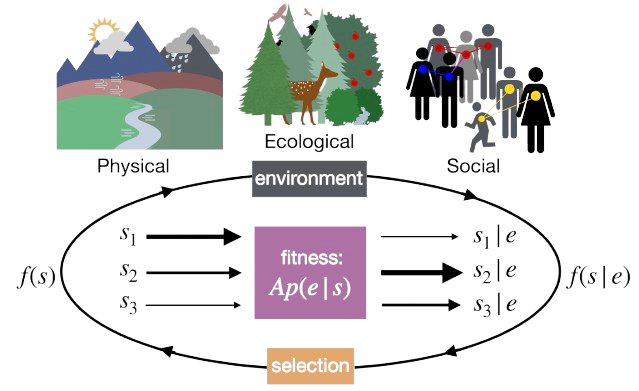Recent Publications
Information Synergy Maximizes the Growth Rate of Heterogeneous Groups
Jordan T Kemp, Adam G Kline and Luís MA Bettencourt
Published in PNAS Nexus pgae072.
February 2024
Published in PNAS Nexus pgae072.
February 2024


Current approaches to studying growth dynamics lack fundamental theory to explain the emergence of coordinated decision-making in groups of heterogeneous agents of arbitrary size. This work proposes a mechanism of information pooling, where the benefits of cooperation are described in terms of information synergy across agents' collective signals in a complex environment. We show that more synergy, defined as information complementarity versus a goal, results in the faster average growth of group resources. This introduces a principle of maximum synergy, which we show can be attained by learning over time and drives selective group formation. This work creates new insights into how structured organizations are created, and how they can be optimized over time in response to dynamical environments.
Link to reprint
Link to reprint
Learning Increases Growth and Reduces Inequality in Shared Noisy Environments
Jordan T Kemp and Luís MA Bettencourt
Published in PNAS Nexus pgad093.
March 2023
Published in PNAS Nexus pgad093.
March 2023


Current approaches for studying wealth dynamics and inequality lack a foundational theory to derive growth rates from social behavior in unknown environments. Devising effective interventions to manage economic growth rates, financial instability, and population inequality remains therefore difficult. Here, we propose a general approach to this problem based on agent decision-making in noisy environments, using concepts of information and learning. We show that expanding learning reduces resource inequality over time, as more agents are able to tap opportunities in their environment. This perspective connects wealth dynamics to important behavioral and social phenomena such as the environmental determinants of learning and development, the influence of socioeconomic stratification and segregation, and information sharing, cooperation and resilience in the face of uncertainty.
Link to reprint
Link to reprint
Stochastic Pairwise Preference Convergence in Bayesian Agents
Jordan T Kemp, Max-Olivier Hongler and Olivier Gallay
Published in Physical Review E 110.1. November 2023
May 2024
Published in Physical Review E 110.1. November 2023
May 2024


Significance Statement: Understanding how beliefs and preferences evolve is critical in analyzing human behavior across physical, ecological, and social environments. This paper develops a Gaussian pairwise interaction model employing sequential Bayesian inference to explore how agents' preferences dynamically converge based on mutual observation. By framing the dynamics as an Ornstein-Uhlenbeck process, we analytically derive conditions under which preferences converge, highlighting the role of learning rates and uncertainty in determining equilibrium behaviors. The resulting insights bridge gaps between learning theory, non-equilibrium statistical physics, and economic theory, allowing more robust modeling of interactions in principal-agent problems and markets. Ultimately, this work offers foundational tools to study complex preference dynamics influenced by both internal decision processes and external environmental signals.
Working Papers
Previous Research
Statistical Dynamics of Wealth Inequality in Stochastic Models of Growth
Jordan T Kemp and Luís MA Bettencourt
Published in Physica A Volume 607, 128180.
September 2022
September 2022


Understanding the statistical dynamics of growth and inequality is a fundamental challenge to ecology and society, but we still lack a general statistical theory for growth rates across a population. Here we derive the statistical dynamics of correlated wealth growth rates in heterogeneous populations. Our findings show that the effects of differences in growth rates are critical for understanding the emergence of inequality over time and motivate a greater focus on the properties and origins of growth rates in stochastic environments
Link to reprint
Link to reprint
Find me on Google Scholar and Researchgate

